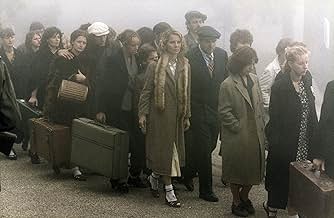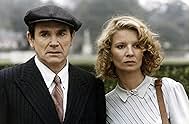Les uns et les autres
- 1981
- 3h 4m
IMDb RATING
7.3/10
2.9K
YOUR RATING
The intertwined lives of three generations of musicians and dancers from Russia, Germany, France and the U.S., from before World War II through the war and the Holocaust, to the 1980s.The intertwined lives of three generations of musicians and dancers from Russia, Germany, France and the U.S., from before World War II through the war and the Holocaust, to the 1980s.The intertwined lives of three generations of musicians and dancers from Russia, Germany, France and the U.S., from before World War II through the war and the Holocaust, to the 1980s.
- Awards
- 1 win & 6 nominations total
- Director
- Writer
- All cast & crew
- Production, box office & more at IMDbPro
Featured reviews
I happened to be in Paris when this film was released. I was able to see it three times in 2 weeks at a theater who did English Subtitles. What an incredible movie. Unfortunately, it was released within months of Blake Edwards "10" which also used "Bolero" as it's main theme and that movie went over big time in the US, so distributors had a problem getting this film out. I wish they would re-release it. The thing I enjoy the most about it is the director's multiple uses of the actors. Many play their characters children and grandchildren. It is also an incredible look at a time when the world was trying to blow each other up and it shows that people everywhere just want the same things. A brilliant film.
I was in Strasbourg, France in 1981 when this film first came out and saw it in a movie theater. It was a compelling film and spoken not only in French, but German, Russian and English, according to the character's language. I loved the story, the music (my favorite rendition of Bolero), the incredible dancing, the acting. I even acquired the soundtrack and a VHS of the movie after seeing it, even though I don't typically acquire copies of movies once I have seen them. This film is and will always be my favorite film of all time. I happened to be studying the subject of international human rights law in Strasbourg at the time, so it seemed fitting to see this movie about WWII and the humanitarian aspects of the finale of the film. Our world has become so interdependent that other directors should take note of this little-known film and its use of multiple languages to great effect.
10Guy33134
Well, I'm obviously not alone in saying this is the best, the greatest, the finest movie, etc. So what's with the rating? Again, as in many cases of movies with few votes, a small group skews the score to a ridiculous level. I saw this masterpiece in Paris when it came out in the early 1980's, and went back to see it the nest day. It was too much exquisite detail to take in during one sole session. The development of the characters, interwoven into the fabric of tragedy that was the war, the haunting Bolero by Ravel. Devastingly beautiful touching, and grand. Since this film, Lelouche (A MAN AND A WOMAN, LES MISERABLES (1994) has made a few films touching on his autobiographical experiences as a young Jew, during the Holocaust. This movie was made before there were dozens of them to compare to, like Lelouche's own perhaps just as good LES MIS... with Jean-Paul Belmondo. Having lived in France, I know there are many cinephiles who just outright hate Lelouche. These feelings, as I have experienced them, are thinly-veiled anti-semitic feelings. Say, it may be an "artsy" way of saying I'm an anti-semite: J'aime pas Lelouche. I think this is why this movie is undeservedly ranked so low in this base. I came across, and voted on it a while back, precisely because the rating shocked me so. As I went through the comments though today, I was happy to see I was not alone, and thought I would throw my "ten francs worth" in. I want to buy it for my collection.
First thing to bear in mind is that like Hossein's "les Miserables" or Enrico's "Au Nom de Tous les Miens",the movie which was theatrically released is a digest of a miniseries ,the running time of which exceeded six hours.In three hours,there are too many characters ,and Lelouch uses the same thespians to portray the parents and the children (Chaplin,Caan,Bouix...)which sometimes is a mess.But it's Hossein who gets the biscuit:even "made look younger" ,he was 54 at the time and it's impossible to believe he is a soldier coming back from the Algeria war.
It can be looked upon as a musical ,but the only musical sequence which is really awesome is Ravel's bolero where the four (French,Russian,German and American) families prove us (as if we did not understand) that it's better making music than making war.Thank you and God bless you all.
That said ,there's that optimistic bourgeois side in Lelouch's movies;it's so glaring here that it becomes sometimes unbearable.With a few exceptions (Garcia's husband,the girl who used to play around with the Germans,victims of war),it's a success story.We deal with educated brilliant people whose career will take them to megastardom after the war.There's a French film made up of sketches called "Retour à la vie" which depicted the fates of four men and a woman after WW2.Their future was not so bright: the concentration camps ,it's not a thing you forget overnight.You are going to say,Nicole Garcia ends up in an insane asylum.Probably but long after the war.In "Retour à la vie" Aunt Anna was so weak and so traumatized she could not utter one word.
The cast is admittedly impressive.But if the leads were not played by celebrities such as James Caan,Geraldine Chaplin or Fanny Ardant,we would be lost in a terrible mess.Ansd sometimes I must confess I do not know if it's the father (mother) or the son (daughter).And Lelouch spared us the third generation (they are still brats).To think that the last part of "Toute une Vie" (1974) another extravaganza which spanned a century,the last part was pure sci-fi and took us down to the future world! Les uns will like.Les autres won't.
It can be looked upon as a musical ,but the only musical sequence which is really awesome is Ravel's bolero where the four (French,Russian,German and American) families prove us (as if we did not understand) that it's better making music than making war.Thank you and God bless you all.
That said ,there's that optimistic bourgeois side in Lelouch's movies;it's so glaring here that it becomes sometimes unbearable.With a few exceptions (Garcia's husband,the girl who used to play around with the Germans,victims of war),it's a success story.We deal with educated brilliant people whose career will take them to megastardom after the war.There's a French film made up of sketches called "Retour à la vie" which depicted the fates of four men and a woman after WW2.Their future was not so bright: the concentration camps ,it's not a thing you forget overnight.You are going to say,Nicole Garcia ends up in an insane asylum.Probably but long after the war.In "Retour à la vie" Aunt Anna was so weak and so traumatized she could not utter one word.
The cast is admittedly impressive.But if the leads were not played by celebrities such as James Caan,Geraldine Chaplin or Fanny Ardant,we would be lost in a terrible mess.Ansd sometimes I must confess I do not know if it's the father (mother) or the son (daughter).And Lelouch spared us the third generation (they are still brats).To think that the last part of "Toute une Vie" (1974) another extravaganza which spanned a century,the last part was pure sci-fi and took us down to the future world! Les uns will like.Les autres won't.
Just viewed this movie on a DVD from Netflix. This movie is what a motion picture can be in the hands of an intelligent and talented director.
The photography was wonderful, the use of color was spectacular, the sound was excellent, and the music and performances were top notch. I especially liked the full symphony orchestra segments and the American big band segments. The Folies-type musical numbers were also done with flair, and Geraldine Chaplin proved herself to be a classy cabaret singer (assuming her voice wasn't dubbed). Michel Legrand I believe was responsible for the music, which was first rate throughout.
All production values were of the highest order.
The final dance sequence, which lasted far longer than anything Hollywood would permit, was phenomenal; the late Jorge Donn was not Nureyev, but spectacular all the same. The robustness and uncompromisingly balletic style of the finale put the ballet sequences in a couple of American movies--American In Paris and Carousel-- in the shade.
Released in the U.S. as Bolero, apparently. Without car chases, explosions, etc., I doubt if it did very well at the box office over here.
The photography was wonderful, the use of color was spectacular, the sound was excellent, and the music and performances were top notch. I especially liked the full symphony orchestra segments and the American big band segments. The Folies-type musical numbers were also done with flair, and Geraldine Chaplin proved herself to be a classy cabaret singer (assuming her voice wasn't dubbed). Michel Legrand I believe was responsible for the music, which was first rate throughout.
All production values were of the highest order.
The final dance sequence, which lasted far longer than anything Hollywood would permit, was phenomenal; the late Jorge Donn was not Nureyev, but spectacular all the same. The robustness and uncompromisingly balletic style of the finale put the ballet sequences in a couple of American movies--American In Paris and Carousel-- in the shade.
Released in the U.S. as Bolero, apparently. Without car chases, explosions, etc., I doubt if it did very well at the box office over here.
Did you know
- TriviaFrancis Lai: The composer appears as the blind accordion player.
- Goofs(at around 1h 21 mins) The soldiers are playing cards on the train and the game they are playing changes between shots.
- Crazy creditsThe grand majority of the opening credits are spoken by the narrator. The narrator stops after crediting the choreographer. Only the film's production company, title and the name Claude Lelouch appear in writing before the Bolero dance at the opening (when the writing is onscreen, the orchestra is warming up). Also, a quote by Willa Cather appears at the very beginning.
- Alternate versionsPresented on French television in a 6 hours version quite clearer then the shortened American release. Richard Bohringer and Fanny Ardant's characters, for example, are better developed.
- ConnectionsEdited into Les uns et les autres (1981)
- SoundtracksFolies Bergère
Music by Francis Lai
Lyrics by Boris Bergman
Performed by Catherine Russell and Ginette Garcin
- How long is Bolero?Powered by Alexa
Details
- Release date
- Country of origin
- Official sites
- Languages
- Also known as
- Bolero
- Filming locations
- Garancières, Yvelines, France(Railway crossing and station scene)
- Production companies
- See more company credits at IMDbPro
- Runtime
- 3h 4m(184 min)
- Color
- Aspect ratio
- 2.35 : 1
Contribute to this page
Suggest an edit or add missing content




















